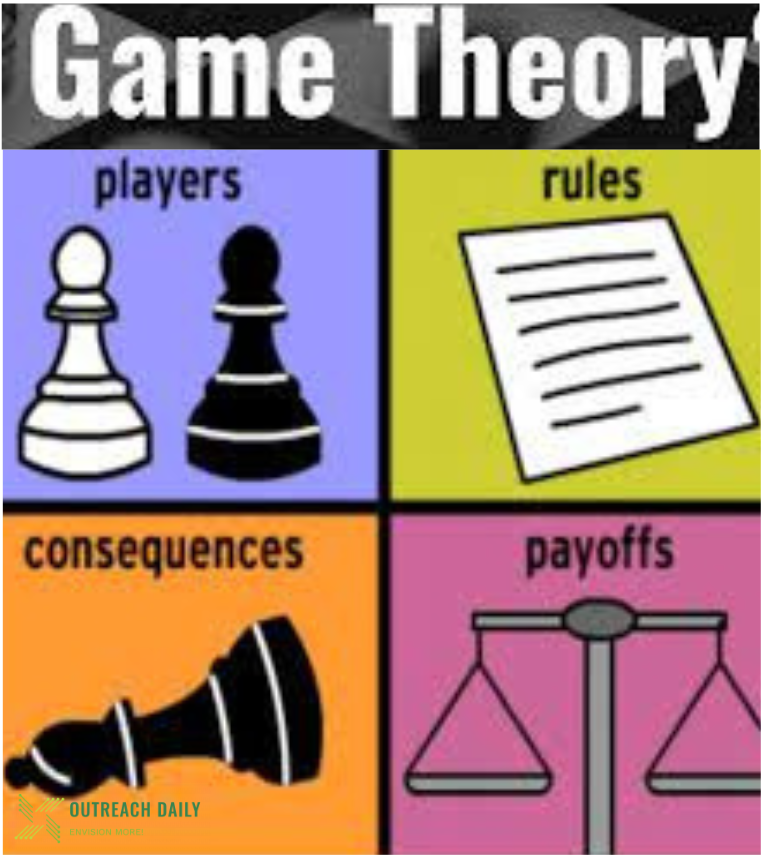In economics, game theory is a mathematical framework used to analyze the strategic interactions amongst logical decision-makers. It examines the decisions and actions made by people or businesses when the results of their choices are influenced by both their own and other people’s activities. It is commonly used to comprehend and forecast participant behavior in strategic settings across a wide range of economic scenarios.
Several essential elements in game theory aid in defining the dimensions and structure of interactions between rational decision-makers. These elements are essential for comprehending the dynamics of strategic relationships and assessing the possible results of various situations.
Some of the key components of game theory in economics include:
Players:
The players in the game, which might be individuals, businesses, or other entities, each having their own preferences, tactics, and possible rewards. Based on their responsibilities and interactions in the game, players might be grouped.
Strategies:
The range of options that each player has and which can result in various outcomes. A player’s whole course of action, including how they will react to other players’ moves and handle different situations, is outlined in their strategy.
Payoffs:
the results or benefits connected to the various combinations of tactics that the players select. Market share, utility, financial benefits, or any other quantifiable result that represents the players’ goals or interests can all be considered payoffs.
Information:
The information that every player has about the game, including the accessible procedures, the settlements related with various activities, and the choices made by different players. Data can be lopsided, with various players having differing levels of information about the game and its boundaries.
Equilibrium:
A vital idea in game hypothesis, balance alludes to a steady state where no player has a motivator to stray from their picked technique singularly. Normal sorts of balance incorporate Nash harmony, where no player can help by changing their procedure while others keep their techniques unaltered, and subgame wonderful harmony, which stretches out Nash harmony to successive games.
Types of games:
Game theory envelops different kinds of games, including concurrent move games, successive move games, agreeable games, and non-helpful games. Each sort of game has own arrangement of rules and attributes impact the techniques and results.
Understanding these key parts empowers business analysts to dissect vital direction, anticipate the way of behaving of sane specialists, and infer experiences into different monetary and social circumstances, going from market rivalry and haggling cycles to global relations and ecological dealings.
Significance of Game Theory:
Game theory holds significant importance in various fields due to its ability to model strategic interactions and decision-making processes among rational actors.
Some of the key reasons why game theory is essential include:
Strategic decision-making:
Game theory gives an organized structure to examining key communications and dynamic cycles in different genuine circumstances, like business rivalry, global relations, and talks. Understanding the methodologies and expected settlements of various decisions can assist people and associations with pursuing more educated choices.
Predictive Power:
By utilizing game theory models, financial specialists, policymakers, and investigators can foresee the probable results of key communications and expect the way of behaving of people or elements inside complex frameworks. This prescient power empowers better preparation and dynamic in dubious or serious conditions.
Conflict resolution:
Game hypothesis can be utilized to investigate and determine clashes by distinguishing potential arrangements that can help all gatherings included. Through the investigation of helpful game hypothesis, experts can plan instruments and procedures that energize coordinated effort and split the difference, prompting commonly advantageous results.
Market competition:
In the field of financial aspects, game theory is utilized to examine serious business sectors, oligopolies, and vital connections between firms. By understanding the procedures and ways of behaving of contending firms, business analysts can acquire experiences into market elements, estimating systems, and the potential for intrigue or serious techniques.
Policy design:
Game theory gives an important device to planning successful strategies and guidelines in different regions, including ecological administration, medical services, and money. By taking into account the likely reactions and ways of behaving of partners, policymakers can make approaches that boost helpful results and beat unsafe ways of behaving down.
Evolutionary biology and social sciences:
Game theory has also found applications in fields such as evolutionary biology, sociology, and psychology. It helps in understanding social behaviors, the evolution of cooperation, and the dynamics of social networks, providing valuable insights into human and animal behavior in group settings.
Negotiation strategies:
Game theory is as often as possible used to investigate exchange systems and results. By understanding the likely settlements and motivators of different discussion strategies, people can pursue informed choices and foster successful methodologies to accomplish their ideal results in bartering circumstances.
Overall, game theory plays a crucial role in providing insights into complex decision-making processes and strategic interactions, thereby facilitating better understanding and management of various economic, social, and political systems.

The writer is having vast experience in Banking and Finance sector for over one and half decade, where during his period of work he has experienced different economic and development initiatives taken for the wellbeing of the public masses through the banking channel.
He has worked for the Microfinance banks which are offering community based services among the under developed segment of the society.
The major work done in Financial Inclusion where several hundreds of people were brought to Banking channel to improve their businesses.
The under served segment of society like woman were given the chances to change their lives through credit facilities to grow their home based businesses which is also an imitative of Women Empowerment.
The Writer has also worked against different social issues and highlighting them for positive change in the society through public awareness and their active involvement to reach to the solution.
This journey of empowering people is on going and is never lasting till the time last person remains underserved.







